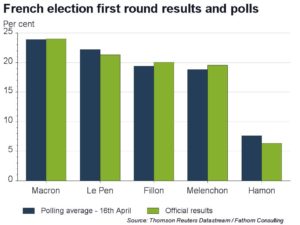A sideways look at economics
Let’s face it, 2016 was not a good year for political pollsters. The breakthrough year for nationalism was met with shock results for both Donald Trump becoming the President of the United States and the UK’s decision to leave the EU, with polls underestimating the respective likelihoods of such events. However, the results of the first round of elections in France suggest Europe’s second largest economy will stay on the internationalist side of the line. Centrist Emmanuel Macron won the first round vote with 24.01%, with Front National candidate Marine Le Pen in close second with 21.30%, both remarkably close to estimates prior to the vote. In-fact, voter share of all five main candidates came within around 1 percentage point of what the polls predicted.
How did they do it?
Front National is a well-known brand in France with infamous history in previous elections. Marine Le Pen last ran in 2012, and didn’t even make it into the second round. Her father, the controversial Jean-Marie, whom Marine has long tried to de-attach herself from, had been participating in elections as far back as the 1970s. Recently, Mme Le Pen has taken that a step further, relinquishing her responsibilities as leader of her party to focus on her campaign and distance herself from the controversial Front National brand. The remarkable accuracy of the French election polls could have something to do with how they are conducted. Polls in France are carried out in a slightly different way to other developed countries, relying more heavily on online respondents, who can crucially remain anonymous. It is no secret that voters are more inclined to express their political preferences online than over the phone or face to face.
Sunday’s first round of the election was not the be-all and end-all, but now the French electorate face a real choice. The winner of the first round has gone on to win the second round in six of the nine elections since 1965. Albeit by a small margin, Mr Macron’s success in the first round bodes well for our central scenario. Indeed we assume that centrist candidates are successful in the upcoming elections around Europe, not only in France, but in Germany and Italy too.
If we are right, then there may be a glimmer of light at the end of the tunnel for the euro area. Our ‘golden scenario’ stems from the fact that Mr Macron is committed to reforming the euro from the inside. Combined with the election of pro-European Martin Schulz or Angela Merkel in Germany (for what would be her last term in office and opportunity to leave a lasting, positive legacy). This could result in the two most powerful member states, whose close embrace has been the cornerstone of Europe and especially the euro area, ‘doing the right thing’ and setting the euro area down the path of becoming a single state, effectively moving towards a full political union.
With just nine days until the second round of elections, the polls suggest that Mme Le Pen will outperform her father’s results back in the early 2000s, but will lose to Mr Macron by a considerable margin. However, we have very recent reminders as to how polls can get it wrong. Mme Le Pen winning on 7 May remains within the realms of possibility. Just.
